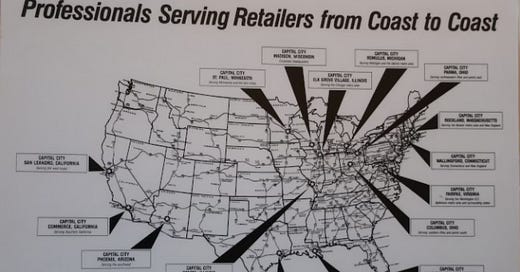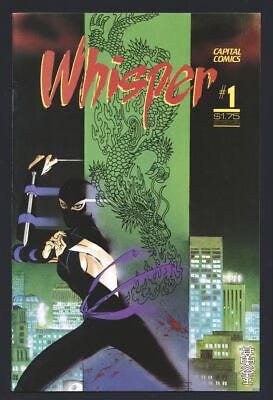Truth be told, I rather doubted I was ever going to do a piece of Capital. Only the most earnest of comic book collectors know they were ever more than a comics distributor. Their most popular titles were picked up by First Comics and I’ve already covered those.
However, recent events have highlighted just how Capital was very important in one respect. Its failure.
Sometime around 1970, two filthy communist hippies named Milton Griepp and John Davis founded Wisconsin Independent News Distributors (WIND). It’s difficult to get a more accurate date than that, they didn’t keep very good records, their activities were borderline illegal in quite a few places and most of the employees were allegedly too stoned to remember when they set up shop. Regardless, they were very much into the Counter Culture movement. It was one of those student collectives that were so popular in college towns back then.
WIND distributed anything to do with the Student Left in those days. They distributed underground newspapers, the Weather Underground manifesto, and most anything pertaining to drugs and music. As well as a few underground comics.
Their customers were head shops, food cooperatives, music stores, and most surprisingly legitimate periodical retailers. They later discovered that they were under police surveillance and it’s quite possible the UC officers were doing most of the work. These things happened back then, and in situations like this the undercover cops’ reports would basically read, “harmless dipshits.”
Eventually, the students graduated, and for all their talk of bringing down the system, got haircuts, and jobs and became a part of it. WIND was no different. As the lefty retail customers dried up they began to rely more and more on comic books. By then they had connections with the local Midwest companies that did the printing for DC and Marvel and thanks to Phil Sueling they needed a new distributor. One cash crunch later and they were bought up by Big Rapids Distributors out of Michigan. Milton Griepp and John Davis went to work for BRD as part of the buyout.
All did not go well in this venture. Another cash crunch came and went leaving Big Rapids Distributors bankrupt. Davis came to Griepp and basically said, “We’re out of work anyway and we already know everybody on all sides of the comics business. The publishers, the printers, and the retailers. Big Rapids’ collapse has created a vacuum in a market where all the leading indicators are headed up. If we don’t step into that vacuum someone else is bound to. So why not have it be us, we know everything about this business.”
They even knew where to get warehouses, trucks, and drivers because Big Rapids was having to sell those off. And so Capital City Distributors hung out their shingle and started riding the wave of the 1980s Comics Boom.
They quickly became the dominant distributor in the Midwest. In fact, the only distributor of any note.
Capital became aware that their colleagues, if not quite competitors, Pacific Comics had started publishing their own line of comic books. Since Pacific was at the time, the industry leader, it probably seemed like a good idea to get into the publishing end of things.
Capital’s first title, Nexus, started as a black and white. I already covered Nexus in my piece on First Comics, which is where the title migrated after Capital quit the publishing business. The same goes for Badger.
However, there was one title that had the same career path that I didn’t cover. Mostly because it’s not as well known today but truthfully it wasn’t bad.
Whisper
Alexis Devin is a Gaijin raised in Japan by her stepfather and step-grandfather. To help overcome her polio, they teach her martial arts and Ninjitsu (kindly roll with it, I didn’t write it). More realistically she has a rough time in Japan as a Gaijin growing up in the seventies. She hot-foots it back to the States to become an architect. She goes back to Japan for a visit just as the Yakuza decides to kill everyone she loves there. So she dons an outfit that looks like a female version of Diabolik’s and starts doing the revenge thing.
Given the politics of the publisher, she is unsurprisingly, a politically active, anarchist. Kind of like Diabolik but she actually fights crime. However, she never came across as a superhero.
That was it for Capital Comics. I suspect they found it a distraction from their primary business of distribution. That was growing so fast, that they probably did find publishing a time sink and a nuisance. After a few issues, their titles all moved to First Comics where a few of them continued off and on for decades.
They made the right call. In 1984 Pacific Comics collapsed and Capital City moved on their turf big time. They bought up all of Pacific’s distribution centers and warehouses.
However, Capital did have a rival. Diamond Distributors. As smaller distributors ran into cash flow problems due to the unstable nature of the comic book industry, Diamond would buy them up.
By 1988, Diamond and Capital City controlled 70% of the market in the United States. By the early 1990s Capital was big enough to hold its own exclusive trade shows. Milton Griepp became known for innovation in an industry that has never been wild about the idea. He introduced computer ordering by the comic stores. As well as reintroducing penalties to publishers that didn’t provide their products by the promised deadline. He also reintroduced 30-day remaindering that hadn’t been in effect since comic books were on spinner racks.
However, all of this came to an end in 1995 when Marvel made its legendarily terrible business decision to buy up Heroes World Distribution to be their exclusive distributor.
Both Capital and Diamond had just lost one-third of their titles. Diamond and Capital went into a bidding war with DC to become their exclusive distributor.
Diamond won.
Worse still for Capital, Diamond won exclusive distribution for Image and Dark Horse as well. Capital launched a lawsuit against Marvel, mostly in the hope of getting back something to distribute.
All of the smaller distributors were in the disastrous position of having their income reduced by 40% but having their expenses remain constant. The lucky ones were able to sell out to Diamond, the rest went out of business.
Heroes World was a disaster for Marvel from beginning to bitter end. It didn’t have anywhere near the capacity to deliver on Marvel’s orders. There were extensive shipping and billing mistakes and Marvel was forced to dump the shipping costs onto the comic shops. The shops had the only unholy pain in the ass of having to fill out two orders on top of paying for shipping, which led to a wave of comic shop closures, better known as the Nineties Comics Crash.
Due to Heroes World’s haplessness and lawsuit itself, Marvel started shipping with Capital for a few months. It was too little, too late. Capital had acquired a few exclusivity agreements themselves with Kitchen Sink, TSR Comics, and manga importer Viz. But it wasn’t enough to close the wound Marvel had made.
Faced with bankruptcy, Milton Griepp had no choice but to sell out to Diamond Distributors. In 1997 Ike Perlmutter and Ari Arad launched a hostile takeover of Marvel, this led to Heroes World being shuttered and Marvel returning to Diamond Distributors who was now the last man standing. Diamond held a monopoly on comic books in the North American market from then until Covid.
The rest of the story was a long downhill slide into placidity, inefficiency, and a stranglehold on a market that was being strangled by a shrinking market and disinterested corporate overlords.
Diamond went into bankruptcy this year and will be auctioned off in March.
As for Milton Griepp, he started the fairly successful industry newsletter ICv2.
Capital as a publisher barely made a ripple. But as a distributor, it was the only real competitor Diamond had. Today comic book lovers can only now look at Capital’s memory and mutter the saddest of words, “If only…”
Discuss in the Comments Below







Capital was our secondary distributor in the early 90s, behind Heroes World. Capital and Diamond rapidly reduced catalog space for indies, as Marvel and DC merch took up bigger bites of their catalogs each month. We were glad that we exited before the Heroes World debacle.
"The Death of Superman" told us all we needed to know about mainstream comics, and that would be the death knell for general indie distribution as well when Marvel went exclusive with Heroes World, until the Internet became commercialized.